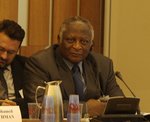Bernard MUNA
contribution 06 -
MUNA Bernard Acho

original version
President, I want to approach this question from the angles of the parties to the trial. I believe that the Tribunal concentrated too much on the accused persons and forgot that there were other parties. And I ask this question: Is the society, the society whose values, whose tranquillity has completely been broken and destroyed, is this society not a party to the process in this particular context? Are the victims, in fact in Rwanda we neglected the victims for quite a while, are the victims not a party to the process?
Then we forget the witnesses. In this particular case, in your investigation, your are concentrating on the guilt of the accused persons. You are completely neglecting the rights of the other parts of the society, like the society as a whole. The people in society have the right to have a peaceful society. When you cause a breach of the peace within a peaceful society, you also breach the rights of the society.
In this narrow approach, evidently in investigating we did not concentrate on the other "parties", the society and the victim. We did not concentrate on their rights, and, therefore, we did not concentrate on the investigation of what was breached and what they did and what they did not do.
I think that it will be very advantageous in the future that we look at it more broadly, especially in crimes involving violations of human rights which takes place within a society. We consider that the society is a party to the process, before going to the victims and so forth. Therefore, that’s why yesterday I was being a common law lawyer myself. After four years in Rwanda, the civil law approach, the “Ministère public” “le procureur” is not common for us who have been brought up within the common law system because we have divided roles. But with the approach of “Ministère public” who has a bigger global picture and who is supposed to investigate a bigger global picture, I think, with the apologies to my common law friends, that we should really look in the future at establishing courts especially where there is breach of the international humanitarian laws which have a sort of a better global approach which resembles that of the Minsitère public. I think in the future we can even improve the role of Ministère public so that some of these lapses can be cured.
But, in the final analysis, the investigations and the administration of proof came from our approach to the problem looking basically at the accused and trying to avoid to breach his right and forgetting about the rights of other people.
J.M. SOREL
Merci pour ces témoignages et ces remarques très intéressantes qui continuent en quelque sorte d’alimenter la question du modèle.
Dans le procès, il y a beaucoup de choses importantes, il y a des preuves. Tout à l’heure, André Guichaoua disait : « Quand même, une preuve, c’est mieux qu’un témoignage », un mauvais témoignage ou même un bon témoignage. Je voudrais justement m’intéresser maintenant aux témoins, parce qu’on en parlera à plusieurs reprises. Je compte revenir ensuite sur la Défense.
Mais je souhaitais éventuellement donner la parole à Madame Becky parce qu’elle s’occupe de la protection des témoins et je pense qu’elle peut nous apporter des informations sur la manière dont les témoins ressentent le procès et la manière ou l’importance de ces témoins dans le procès.
Si vous le souhaitez, j’aimerais que vous vous exprimiez sur ce point-là, mais ce n’est pas obligatoire, encore une fois, c’est comme vous le souhaitez.

